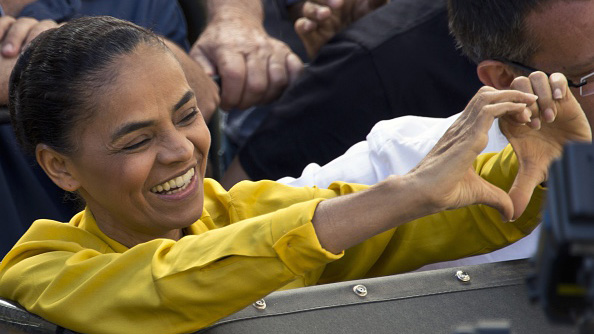The rise of Marina Silva: shaking up politics in Brazil
While the last decade has seen a wealth of political apologues across Latin America, the Brazilian story that has captured the imagination of the country is certainly one of the most compelling.

It’s a fairytale that now only lacks the fitting finale.
Born to a poor mixed-race family of rubber tappers on the edge of the amazon with ten siblings, Marina Silva was thrust to the forefront of Brazil’s presidential election campaign less than three months ago.
She has since ignited an otherwise moribund campaign with an emotional appeal that has seen her poll numbers soar, terrifying her incumbent challenger and their party machine. As the country of 200 million takes to the polls tomorrow, Silva is still pushing hard.
When her Socialist Party candidate Eduardo Campos was killed in a plane crash in August, few predicted she had the experience or nous to rival President Dilma Rousseff.
The Workers Party (PT) had been in power since 2003. It had overseen an economic boom, falling poverty levels and unemployment, all alongside a 50 percent surge in the minimum wage since 2008.
Personal plight
But Silva’s campaign to win Brazilian hearts has taken almost everyone by surprise, and her remarkable personal plight has captured imaginations globally.
Illiterate until the age of 16, she survived malaria and mercury poisoning as a child, and fought alongside the environmental leader Chico Mendes before he was killed in 1988. The former communist party member was even a PT environment minister before breaking away to run for presidency in 2009.
Yet it is her rejection of the political establishment that has been her primary appeal to voters. Eschewing many of the financial perks of office, Silva has railed against corruption and complacency, offering what she has termed a “new politics.”
The campaign has won over large numbers of Brazil’s middle class, tapping into widespread disaffection with political elites and a sluggish economy that has slowed in recent years. Silva has engaged in live Facebook chats with voters in an effort to reach out beyond the standard campaign tactics, and attempt to connect with those who took part in massive anti-government protests in 2013.
Evangelical beliefs
Yet critics have questioned her evangelical Christian beliefs and her stance on creationism and gay marriage. Her frequent references to God throughout the campaign have proven a vote winner with the growing number of religious conservatives (in an officially secular country), but she has robustly defended herself against claims that she is using her religion to win round supporters: “I don’t want to turn church pulpits into political podiums,” she told a rally in São Paulo.
Rousseff has clearly been spooked. As Silva’s poll ratings surged, the PT raided their $50 million war chest, and went on the offensive.
Attack adverts said (incorrectly) that Silva was going to abolish the popular Bolsa Familia cash-transfer scheme for low-income familes, and claimed that a vote for either of Rousseff’s rivals would undo the social gains of the last 12 years. “From here on, we’re going to keep fighting for education, for health…for those programs we have delivered,” the President told a campaign rally on Friday.
The PT can count on the support of most of Brazil’s poor which still make up the majority of voters. The party machine, including former President Lula – still the country’s most popular politician – have helped claw poll ratings back. Similarly its radical history and impressive social gains will not be forgotten quickly. The President herself was imprisoned tortured by the military government before democracy came about in 1985.
Management of economy
Yet frustrations at the stalled progress of the country’s democratic development have proven difficult to overcome. A recent huge corruption scandal in the state oil company Petrobras have not helped efforts to dispel those claims.
The third place candidate, centrist Aecio Neves, has also proven a thorn in her side, running on a pro-business platform, and criticising her management of the economy.
Dilma still looks set to remain in power, polling around 40 percent, compared to Silva’s 26 and Neves 20 percent respectively, but she looks likely to be forced into a second round run-off. Last year’s unprecedented protests made it clear that Brazil’s two decades of democracy has not sated everyone. One might say Britain’s much longer history has done the same.
But as columnist Fernando Rodrigues wrote this week, “it’s a luxury what we have today. On the eve of our seventh consecutive presidential election, we have three competitive candidates of the highest quality.”
Such gushing may be a little excessive for some, but Silva has proven that the Brazilian public have little time for complacency.
-
Latest news
-
Windrush scandal: returning to the UK after a forty year wait6m

-
Netanyahu ‘survival’ depends on ‘expanding war’ says head of Palestinian National Initiative5m

-
Proposed law change could strip parental rights from paedophiles5m

-
Hugh Grant settles privacy lawsuit against The Sun newspaper publisher2m

-
Post Office Scandal: what did top executive know?6m

-




